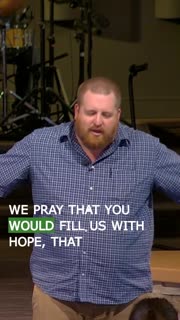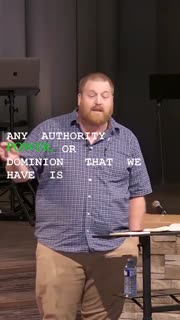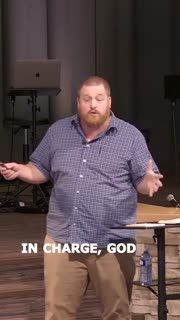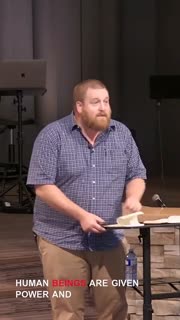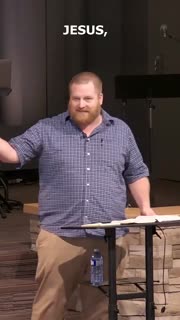Recognizing God's Sovereignty in Authority and Power
Devotional
Sermon Summary
Bible Study Guide
Sermon Clips
### Quotes for Outreach
1. "Isn't it just like God to always be offering a second chance? Isn't it just like God to always be redirecting our perspective towards hope and renewal and new birth and saying, you haven't done this well, but there's an opportunity here." [56:47] (19 seconds)
2. "We thank you for the opportunities that you give us to show no matter who's in charge, you are in charge. Thank you for the stewardship that you have, for the responsibility that you have given to us, that we may worship you through it." [01:06:30] (19 seconds)
3. "May we lift high his name in this church and in this community across Quebec and Canada and to the uttermost parts of the earth, we pray all in the mighty name of Jesus. To you, O God, King of all kings, God above all gods, El Elyon, God most high." [01:07:05] (19 seconds)
4. "I pray this morning that God's sovereignty, his in-charge-ness, his omnipotence, and his might, that it would encourage you, that it would remind you there is absolutely nothing that we can do that can thwart God's plan." [01:07:50] (15 seconds)
5. "We pray that you would fill us with hope, that whatever positions of authority or power you've given us, that we would use them to bring you glory and honor, that we would use any platform that we have to shine a light on you, God most high." [01:13:00] (18 seconds)
### Quotes for Members
1. "Any authority, power, or dominion that we have is only because the God of the universe has given it to us. This is a lesson that King Nebuchadnezzar learned quite well. And I'd like to look at that today as we open up the chapter four." [40:24] (16 seconds)
2. "No matter who's in charge, God is in charge. Whatever power or dominion or authority might be over you in an earthly sense, God is in charge. God is sovereign. He reigns as king over all of that." [42:30] (14 seconds)
3. "Human beings are given power and authority and dominion, but the problem is that we abuse that power and authority. We are given dominion and we corrupt it. We do not wield it or exercise it perfectly as we ought to." [51:00] (17 seconds)
4. "Jesus, part of the Godhead, present and active in creation, the God of the universe, gives it up, suffering and death for us, his people. That is how we are supposed to respond to power and authority and dominion, not to increase our own profile, not to enrich ourselves, not to expand our own sphere of influence, but to care for God's people." [55:12] (33 seconds)
5. "We need to humble ourselves enough to recognize it's only because God has given them to us. The God of the universe has given this into our stewardship, and we need to be good stewards of them. These opportunities, use every opportunity that we have to point to Christ." [01:05:21] (22 seconds)
Ask a question about this sermon
1. "Isn't it just like God to always be offering a second chance? Isn't it just like God to always be redirecting our perspective towards hope and renewal and new birth and saying, you haven't done this well, but there's an opportunity here." [56:47] (19 seconds)
2. "We thank you for the opportunities that you give us to show no matter who's in charge, you are in charge. Thank you for the stewardship that you have, for the responsibility that you have given to us, that we may worship you through it." [01:06:30] (19 seconds)
3. "May we lift high his name in this church and in this community across Quebec and Canada and to the uttermost parts of the earth, we pray all in the mighty name of Jesus. To you, O God, King of all kings, God above all gods, El Elyon, God most high." [01:07:05] (19 seconds)
4. "I pray this morning that God's sovereignty, his in-charge-ness, his omnipotence, and his might, that it would encourage you, that it would remind you there is absolutely nothing that we can do that can thwart God's plan." [01:07:50] (15 seconds)
5. "We pray that you would fill us with hope, that whatever positions of authority or power you've given us, that we would use them to bring you glory and honor, that we would use any platform that we have to shine a light on you, God most high." [01:13:00] (18 seconds)
### Quotes for Members
1. "Any authority, power, or dominion that we have is only because the God of the universe has given it to us. This is a lesson that King Nebuchadnezzar learned quite well. And I'd like to look at that today as we open up the chapter four." [40:24] (16 seconds)
2. "No matter who's in charge, God is in charge. Whatever power or dominion or authority might be over you in an earthly sense, God is in charge. God is sovereign. He reigns as king over all of that." [42:30] (14 seconds)
3. "Human beings are given power and authority and dominion, but the problem is that we abuse that power and authority. We are given dominion and we corrupt it. We do not wield it or exercise it perfectly as we ought to." [51:00] (17 seconds)
4. "Jesus, part of the Godhead, present and active in creation, the God of the universe, gives it up, suffering and death for us, his people. That is how we are supposed to respond to power and authority and dominion, not to increase our own profile, not to enrich ourselves, not to expand our own sphere of influence, but to care for God's people." [55:12] (33 seconds)
5. "We need to humble ourselves enough to recognize it's only because God has given them to us. The God of the universe has given this into our stewardship, and we need to be good stewards of them. These opportunities, use every opportunity that we have to point to Christ." [01:05:21] (22 seconds)




